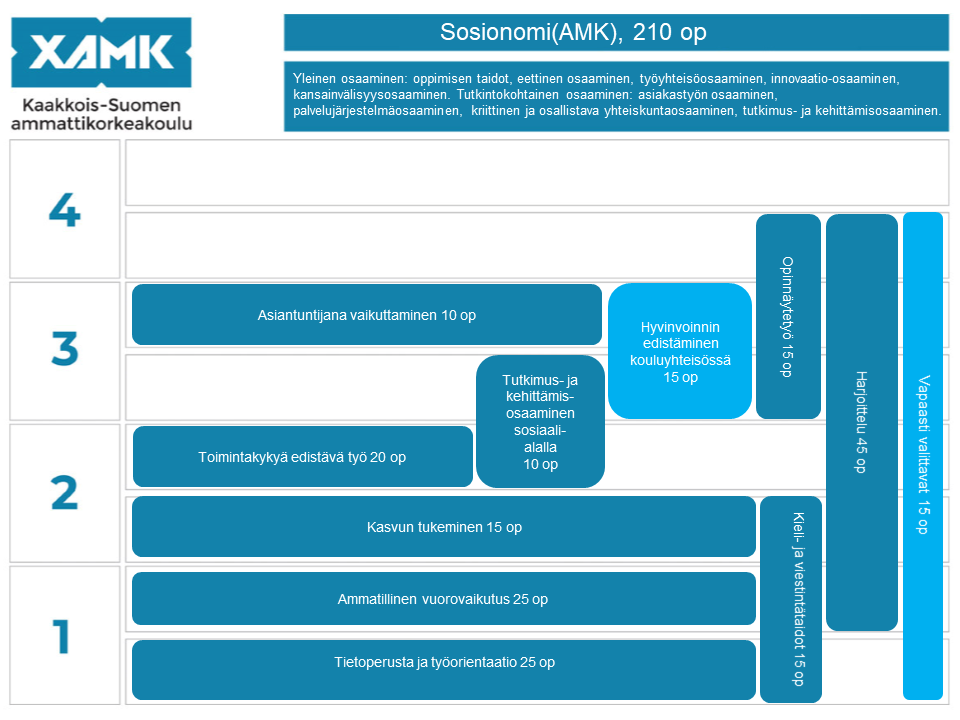Degree Programme in Social Services, school wellbeing
- Degree
- Bachelor of Health Care
- Degree title
- sosionomi (AMK), Bachelor of Social Services
- Credits
- 210 ects
Objectives
Bachelors of Social Services support, counsel and take care of people in different situations in their life. They promote growth and wellbeing and support people’s life management.
You learn to encounter people who have challenging situations in their life and support them in different turning points. You learn to create equal relationships with your clients and their close relatives. You are able to use different methods in your work. You are able to advise your clients to search for services and you know social legislation.
As a professional of school wellbeing, you are familiar with preventive work in child, youth and family services and in the school community. You have skills and competences to support the whole school community and co-operation between families and school.
After graduation, you apply the competences gained in your practical work in the field of social work and develop the work and practices of this field.
Degree programme description
The Degree Programme in Social Services covers 210 ECTS credits and completing the bachelor’s degree takes 3.5 years. The curriculum of the degree programme bases on the following national level of competences for the bachelor’s degree in social services:
• Ethical competence
• Client work
• Service systems
• Critical and participatory social competence
• Research, development and innovation competence
• Work community, management and entrepreneurship competence
In addition, the generic learning outcomes at Xamk comprise the following competences: learning competence, ethical competence, working community competence, innovation competence and international competence.
The structure of the education (210 ECTS credits) consists of 180 ECTS credits core competencies studies and 30 ECTS credits of complementary competencies studies. Practical training comprises 45 ECTS credits.
In core competence studies, you become familiar with the ethical and multidisciplinary basis of social work. You strengthen your interaction and client work skills in social sector. The Degree Programme in Social Services includes the following modules:
Knowledge base and work orientation
Professional interaction
Promoting individual growth and development
Supporting functional ability
Working as an expert in the field of social and school wellbeing work
Research and development skills in social work
Language and communication skills
In complementary studies, you strengthen your school wellbeing competences by studying the promotion of wellbeing in the school community. Optional studies include, for example, functional and art-based methods, media and digital skills in welfare work in schools, peer group and emotional work and educational skills.

Implementation of studies
The education is carried out on the Savonlinna campus.
The Degree Programme in Social Services makes use of various teaching and learning methods, including lectures, independent studies, exams, group work, online studies as well as projects and assignments which are carried out in cooperation with the working life. The Learn online learning environment is used to support studying. You also have the possibility to gain international experience through a student exchange period or practical training abroad.
Online teaching and eLearning environments are also in use on many courses. Practical training covers 45 ECTS credits (31 weeks) both in full-time and blended studies. The practical training comprises four separate training periods
Career opportunities
The job title after graduation can be, for example, social advisor, school social worker, counsellor in charge, service supervisor, family worker, kindergarten teacher, project worker and service home manager. The number of job titles for social service professionals with a bachelor’s degree has decreased in recent years, and most typically, in compliance with the current legislation, the title will be social service supervisor.
The employment situation of the graduates of social services is good, and over 80% of the graduated students find a job right after graduation. Many students find a job even before their graduation. Even though the employment prospects are relatively good, fixed-term contracts of employment and short periods of unemployment between the working periods are typical among social service workers.
RDI and cooperation with world of work
Työelämäläheinen oppimisprojekti voi syntyä myös tutkimus-, kehitys- ja innovaatiohankkeissa (TKI). TKI-hankkeet ovat laajoja kehittämisprojekteja, joissa pääset mukaan monialaiseen yhteistyöhön alueen toimijoiden, korkeakoulun henkilöstön ja (monialaisten) opiskelijatiimien kanssa. TKI:n ja opetuksen yhteistyö antaa sinulle oppimismahdollisuuksia ja kokemuksia käyttäjälähtöisistä kehittämistehtävistä, jotka kytkeytyvät alueellisiin, kansallisiin tai eurooppalaisiin yhteistyöverkostoihin.
Sosiaalialalla opinnäytetyöt tehdään yhteistyössä työelämän kanssa hankkeistettuina työelämän tilaamina opinnäytetöinä, jotka nivoutuvat kiinteästi alan työhön, sen hankkeisiin sekä työn arviointiin ja kehittämiseen.
Learning environments
A part of your studies is completed outside the classroom, in practical training and in different kinds of projects. Simulated environments, online environments (Ecampus) and RDI projects are also used.
Degree Programme in Social Services, school wellbeing,full-time studies
Timing plan:
Degree Programme in Social Services, school wellbeing,full-time studies
Timing plan:
Degree Programme in Social Services, school wellbeing,full-time studies
Timing plan:
Degree Programme in Social Services, school wellbeing,full-time studies
Timing plan:
Degree Programme in Social Services, school wellbeing,full-time studies
Timing plan:
